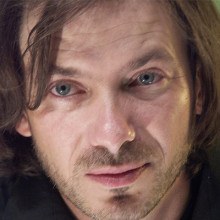Polish literature

Tomasz Białkowski
Born in 1969, Tomasz Białkowski is a prose-writer. He debuted with a collection of short stories called The Pallet (2002), and then published the novels Longeur (2005), Funerals (2006) and World Championship (2008); he has also written a play called The Tree (published in “FA-art” magazine in 2003), serves as editor of Olsztyn’s cultural/literary magazine Portret, and lives in Olsztyn.
Beginning from his debut collection of short stories, The Pallet, Białkowski has consistently written psychological dramas in the spirit of black realism. The action of his texts takes place in the contemporary Polish countryside, in small towns and villages, and mainly concentrates on those who are excluded, who for various reasons have not been granted entrance to the consumer paradise, who are grappling with various kinds of trauma, with the burden of the past and the problems of the present. This Olsztyn-based writer does not stop, however, with sociological statements. He is interested in protagonists who are marked, so to speak, with a flaw of sorts, overly naive or trusting, eternal idealists, or those unable to accept the reigning norms and standards of behavior. The protagonist of Longeur, a man in his early thirties, is incapable of breaking free from his toxic relationship with his father, a true monster whose conscience is plagued by the murder of his wife, the molestation of little girls, and sex with one of his students; and so he follows his parent to the very end, though he realizes it is the road to perdition. Funerals is a tale of the ubiquitous falsehoods that appear at all stages of life, of the fictions that on the one hand distort relationships between people, but on the other allow people to deal with trauma, and in which the protagonist can’t find his way. World Championship is a portrait of a naïf of whom people constantly take advantage, and whose life becomes a chain of grotesque and bitterly comic episodes.
Białkowski’s prose is marked by its multitude of styles. The author uses various conventions and languages, choosing a different style each time around – the one that fits the subject matter best. To take two examples: Longeur reveals the writer’s fascination for the work of Witold Gombrowicz, and World Championship for Czech prose.
BIBLIOGRAPHY
- Leze, Olsztyn: Wydawnictwo “Portret”, 2002.
- Dłużyzny, Olsztyn: Wydawnictwo “Portret”, 2005.
- Pogrzeby, Olsztyn: Wydawnictwo “Portret”, 2006.
- Mistrzostwo Świata, Olsztyn: Wydawnictwo “Portret”, 2008.
- Zmarzlina, Warszawa: Prószyński i S-ka, 2008.
- Teoria ruchów Vorbla, Wyd. Janka, Pruszków 2011.
- Drzewo morwowe, Wyd. Szara Godzina, Katowice 2012.
- Kłamca, Wyd. Szara Godzina, Katowice 2012.
- Król Tyru, Wyd. Szara Godzina, Katowice 2013.
- Powróz, Wyd. Oficynka, Gdańsk 2014.